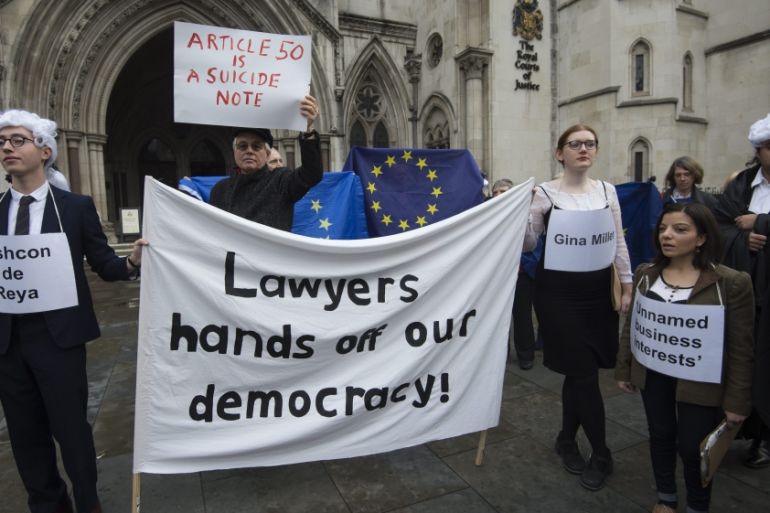Brexit court ruling exposes bitter divide in the UK
MP resignation, tabloid anger, and angry hashtags, a day after judges rule Brexit needs parliamentary approval.

A British High Court decision to require parliamentary approval before starting Brexit negotiations has prompted an angry response from newspapers, politicians, and members of the public.
|
|
Friday’s tabloid front pages were imbued with fury at the judges who passed the ruling and at the activists who brought the case to the courts.
Keep reading
list of 4 itemsNorthern Ireland agreement could end deadlock, restore government
Forced to become British: How Brexit created a new European diaspora
Number of Britons regretting Brexit hits new record high: Survey
The right-leaning Daily Mail included an image of the three judges, plastered with the headline “Enemies of the people”, while the Express called on its readers to “fight, fight, fight” .
The Rupert Murdoch-owned newspaper, The Sun, was accused of racism after it purportedly darkened the face of one of the women involved in the legal action; a Guyanese-born investment banker and British citizen.
Another day, another Daily Mail front page spreading hatred, anger & blame. Now even judges are an 'enemy'. pic.twitter.com/80KdiI4Te4
— Dave Rich (@daverich1) November 4, 2016
Responses to the headlines ranged from calls for executing the judges to comparisons to fascist propaganda.
On Twitter, users started several trending hashtags condemning the newspapers and the government’s response to the Brexit crisis.
The reactions revealed a bitter divide between Britons concerning the fate of their country after June’s vote to leave the EU.
READ MORE: Brexit named word of the year by Collins Dictionary
One user, who appeared to support UK membership of the EU, wrote that the newspaper headlines resembled language used before a coup.
“This is language which might be intended to provoke civil conflict or precede a coup, it has no place in a democracy,” the user wrote.
Another, a supporter of Brexit, said it was the High Court ruling itself that constituted a coup .
“This is a coup, a victory for enemies of democracy. If the roles were reversed there would be riots in the street.”
![Until Thursday’s High Court decision, it seemed Theresa May was appeasing hardliners by opting for a so-called hard Brexit [Hannah Mckay/EPA]](/wp-content/uploads/2016/11/958b06fe86ba4cebaa9c5311d6bef871_18.jpeg)
‘Worrying Trend’
Simon Griffiths, a senior lecturer in politics at Goldsmiths, University of London, said the reaction from the press was part of a “worrying” populist trend in Western countries.
|
|
“The newspaper headlines certainly are quite staggering with judges being personally attacked in the popular right-wing press,” Griffiths said.
“The popular press’ outrage is probably better seen as part of a wider emergence of right-wing populism in the UK and other countries.
“The success of right-wing populism, particularly among groups of people who feel left behind by the economic growth of the last few decades, is a worrying trend.”
Complex route out
The strength of such right-wing feeling adds to the increasingly complex route that British Prime Minister Theresa May faces in taking the UK out of the EU.
Until Thursday’s High Court decision, it seemed May was appeasing hardliners by opting for a so-called hard Brexit.
The move would take the UK out of the single market and allow it to restrict immigration from EU states, a plan opposed by most MPs – including members of her own party.
OPINION: Brexit – The English gamble
But barring a successful appeal, it seems May will have to compromise with MPs.
Richard Whitaker, a specialist in British centre-right parties at the University of Leicester, said while MPs were unlikely to block Brexit entirely, the government’s narrow parliamentary majority would prove troublesome.
“While the court ruling – assuming it stands – will give parliament a say in the triggering of Article 50, it is hard to imagine that MPs would vote against triggering the article,” Whitaker said.
“Nevertheless, some will surely attempt to set some conditions. The government’s freedom to decide on the UK’s future relationship with the EU is therefore going to be restricted to an extent, especially as there is such a small parliamentary majority for the Conservative government at present.”
OPINION: Why Brexit will disappoint Brexiters
According to Whitaker, politicians would have to tread cautiously in balancing their own opposition to Brexit and the result of the referendum.
“I think there would be a political crisis if parliament were to vote against triggering Article 50 as, although this might not be illegal in a technical sense, it would clearly run against the result of the referendum.
“Trying to overturn the referendum result would surely be extremely detrimental for the public’s view of parliament.”
Fresh elections
Ruling Conservative Party MP Stephen Phillips further added to the prime minister’s woes by resigning his seat, citing “irreconcilable differences” with the government over its handling of Brexit.
Phillips, who was part of the campaign to leave the EU, is reported to have been disturbed by the party’s lurch “to the right”.
The Guardian newspaper reported Phillips was angry at the manner in which May had announced a date to start exit talks with the EU without consulting parliament.
OPINION: The UK has no choice on ‘hard’ or ‘soft’ Brexit
The resignation puts further pressure on May to call for new parliamentary elections, but another round of votes brings its own set of problems for the leader, despite her good poll numbers.
“I think many politicians would like to avoid an early election if possible – we are only just under a year and a half out from the last one, ” said Whitaker. “Elections are costly in terms of finance and time.”
|
|